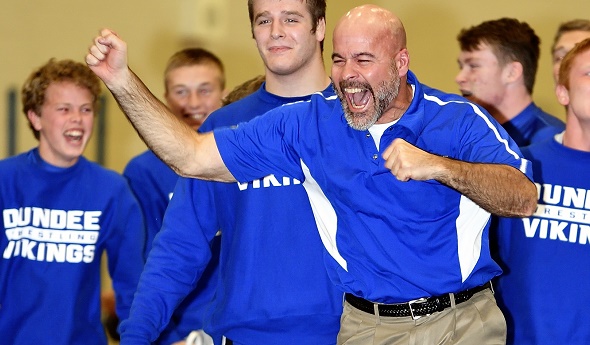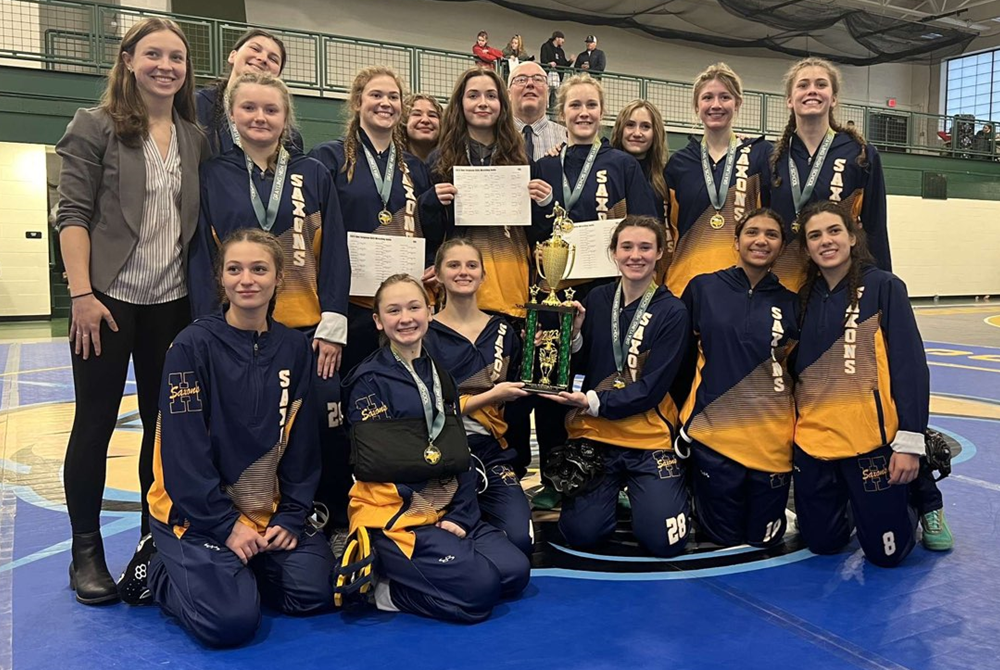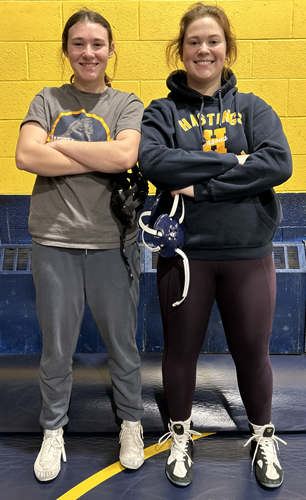
Roberts Drives Dundee to Chase Dream
January 8, 2019
By Doug Donnelly
Special for Second Half
DUNDEE – The thing that keeps Dundee wrestling coach Tim Roberts motivated isn’t another dual meet victory, matching up with state powerhouse Hudson in a conference meet or hanging another banner inside the Vikings’ gymnasium.
 Those things are nice, but what keeps Roberts going in his 20th season as the Dundee head coach is a certain two-time MHSAA Finals-qualifying wrestler from the mid-1980s who won 120 matches for Dundee but ultimately fell short of his goals.
Those things are nice, but what keeps Roberts going in his 20th season as the Dundee head coach is a certain two-time MHSAA Finals-qualifying wrestler from the mid-1980s who won 120 matches for Dundee but ultimately fell short of his goals.
That wrestler was Roberts.
“I’m always trying to prove myself, and I’m always trying to get better,” Roberts said. “When I think of myself as that kid who didn’t place at state, I do much better because I keep that hunger and desire. I need to learn more. I’ve got to get better at this.”
Roberts is already pretty good at what he does – a hall of famer, says Hudson coach Scott Marry, a seven-time MHSAA championship-winning coach himself.
“Coach Roberts is one of the best coaches I’ve ever coached against,” Marry said. “He gets his kids ready mentally and physically. You better have your team ready if you’re going to wrestle Dundee.”
Earlier this season, Roberts reached a career milestone – 500 career wins. He’s led Dundee to six Finals titles and six runner-up finishes, 19 District and 18 Regional titles. He’s coached 32 Individual Finals championship wrestlers and more than 140 all-staters. Under his leadership, Dundee also is approaching 20 Lenawee County Athletic Association titles.
The numbers don’t tell the full story about Roberts, however.
“I could write a book about Tim and how great a coach he is,” said Dundee athletic director Tom Oestrike. “His coaching profile speaks for itself, but what is even more impressive are the type of young men he has helped build in his career – men of selflessness, character and discipline.”
When Roberts wrestled at Dundee, he was a 98-pound freshman who grew to compete in the 126-pound weight class as a senior.
“We were a solid program at the time, (but) winning state was an impossible dream back then for sure,” Roberts said.
“I wasn’t bad at wrestling. I was pretty good. Compared to the guys we have now – I wasn’t as good as them. I thought I was pretty good, but I didn’t accomplish the goals that I wanted to.”
After high school, he enlisted in the Army. It was during that time that he got the coaching bug. He realized he wanted to help young student athletes learn how to get the most out of their careers.
“When I was in the military, I learned a lot about building myself into something and I wanted to share that information,” he said. “I thought about wrestling a lot and how I really didn’t accomplish the goals that I would have liked to, and I wanted to help other people. I had this desire to try to help. I felt like I had a knack for it.”
After his first year as an assistant coach, Dundee changed wrestling head coaches and Jim Wittibslager got the job. Roberts asked him if he could stay on as an assistant.
Wittibslager is a hall of fame coach in his own right. He compiled a record of 333-36-3 in two stints as the Dundee head coach. The Vikings won four straight MHSAA Finals titles during his tenure, from 1995-98.
“We went from a team 4-21 with zero state qualifiers, and by the fifth year we were state champs with 14 state qualifiers,” Roberts said. “It was quite a building process. It was lot of fun to go through and learn. Winning state went from an impossible dream to something that ‘Oh yeah, we could do this.’ We built ourselves into that level.”
Coaching with Wittibslager was a career-changer for Roberts.
“That was crucial in my development in how to coach,” he said. “I thought I had a knack for helping people and I had a little talent in that area, but I learned so much about what it takes, the work ethic and how to win and how to think like a winner.”
Admittedly, Roberts isn’t the same coach he was two decades ago. The sport has evolved significantly.
“I don’t coach now like I did 20 years ago, I’ll say that,” he said. “You grow with the times or you get left behind.”
What hasn’t changed during that time is Roberts’ attention to detail, his passion for coaching the right technique and getting his team ready for meets. Practices now include time in the weight room, warming up with some gymnastics moves such as back handstands, leaps and cartwheels; and, of course, technique.
“We still do conditioning,” he said. “We do quite a bit of that.”
Roberts believes one thing that sets wrestlers apart from each other is how far they can push themselves on the mat – when they reach the point where they feel they don’t have any more strength or ability, they find it.
“The only way you know if you can (push yourself) is by getting (to that point). That, as much as anything, will win you matches,” he said.
Maintaining that success has never been easy. Dundee typically has about 20 wrestlers out each year, a comparably low number to some other high-level programs. But that is where Roberts does his best work. Coaching at the high school level, he said, isn’t about coaching extraordinary athletes – it’s about coaching the average ones.
“It’s been an endless process for 20 years to keep trying to get better at this,” he said. “Average people are who you are coaching. That’s what coaching high school is, I think, learning how to work with the average person. Then, once in a while, you get to work with the exceptional person and that’s fun.”
Despite the enormous success during his 20 seasons at Dundee, Roberts has experienced the same highs and lows as any other coach.
“Lots of highs and lows,” he said. “Lots of times of feeling great, then you get humbled. Then you start feeling great again and then humbled again.”
Roberts coached Dundee to a Division 4 championship in 2001 and Division 3 titles in 2007, 2013, 2014, 2016 and 2018. Last year’s team was ranked nationally and had 14 Individual Finals qualifiers.
“Every one of those (championships) is like the best day of my life,” Roberts said. “Every time. It’s such a great feeling in the end that it all came together, and everything did work, and you did get it all done. A lot of things have to go right. It’s not easy.”
Roberts, 50, isn’t planning on stepping away from coaching any time soon. He’s also not stopping to think about reaching 500 career wins any time soon. He’d rather think about that high school wrestler who missed out on winning a state championship – but has had a remarkable impact on so many others.
“That’s for when you are done (coaching),” he said. “Right now, I’m still trying to get better and trying to work on my weaknesses as a coach and always seeking out how I can be better at this. When you’re done is when you get to reflect.”
 Doug Donnelly has served as a sports and news reporter and city editor over 25 years, writing for the Daily Chief-Union in Upper Sandusky, Ohio from 1992-1995, the Monroe Evening News from 1995-2012 and the Adrian Daily Telegram since 2013. He's also written a book on high school basketball in Monroe County and compiles record books for various schools in southeast Michigan. E-mail him at [email protected] with story ideas for Jackson, Washtenaw, Hillsdale, Lenawee and Monroe counties.
Doug Donnelly has served as a sports and news reporter and city editor over 25 years, writing for the Daily Chief-Union in Upper Sandusky, Ohio from 1992-1995, the Monroe Evening News from 1995-2012 and the Adrian Daily Telegram since 2013. He's also written a book on high school basketball in Monroe County and compiles record books for various schools in southeast Michigan. E-mail him at [email protected] with story ideas for Jackson, Washtenaw, Hillsdale, Lenawee and Monroe counties.
PHOTO: Dundee wrestling coach Tim Roberts and his team celebrate one of the many successful moments during his two decades leading the program. (Photo by David Schankin.)

Hastings Among Statewide Pacesetters as Girls Wrestling Enjoys Rapid Growth
By
Steve Vedder
Special for MHSAA.com
January 12, 2024
Sophia Sunior thought the mat might be the perfect place to learn something new about herself.
 So after hanging around a handful of Hastings boys wrestling practices a year ago, the Saxons senior opted to join the school's fledging girls team. As a former swimmer and current softball player, Sunior considered herself competitive. But the real attraction to wrestling, said Sunior, was to test her own mental and physical boundaries.
So after hanging around a handful of Hastings boys wrestling practices a year ago, the Saxons senior opted to join the school's fledging girls team. As a former swimmer and current softball player, Sunior considered herself competitive. But the real attraction to wrestling, said Sunior, was to test her own mental and physical boundaries.
At first, Sunior struggled with the decision as she met with little success against more experienced wrestlers. But little by little, Sunior began to improve. And that's when she began to discover critical pieces about herself.
"For me, a lot of it was mental," Sunior said. "But I became stronger mentally and physically. Wrestling is probably one of hardest sports there is. It's almost legalized fighting, and I've learned so much about myself. My motto is if I can wrestle, I can do anything. You can learn some of the best (teaching) tools about yourself you can get."
While Sunior started last season slowly, she finished with a bang, placing eighth at MHSAA Individual Finals at 190 pounds. She's started this season with seven wins over her first eight matches.
Sunior is part of what Hastings coach Mike Goggins believes is the largest girls wrestling team in the state with 16 athletes. Goggins, who coached the Hastings boys team for 38 years, switched over to the girls program two years ago. Hastings had five Finals qualifiers and three placers last season.
Goggins isn't necessarily surprised that girls wrestling has caught on at Hastings, which has long had a quality boys program with Goggins' teams winning 11 league championships, 10 Districts and one Regional title and totaling 28 Individual Finals placers under his guidance.
The ability to build a program has carried over to the girls. The team had 14 wrestlers a year ago, and this season’s competitors have come from a variety of backgrounds. Of the 16 total, seven are first-year wrestlers. Three are first-year varsity letter winners, while two play basketball, two tennis, two softball, and one is a volleyball player.
“It's really kind of taken off," Goggins said of the sport. "A lot of the girls had shown interest in boys wrestling, and then when we offered wrestling for the girls, we began to get numbers. I'm not terribly surprised by that. Just the experience of what the girls saw with the boys, I just think they wanted an opportunity."
 MHSAA participation surveys show 100-150 girls regularly participating in wrestling during the end of the first decade of the 2000s, but numbers began growing substantially to match the introduction of a state individual tournament by the Michigan Wrestling Association (the state coaches association) during the 2018-19 season and then the addition of a girls-only division to the MHSAA Individual Finals in 2022. Goggins said the vast majority of girls would much rather compete against girls. “I'd say 10 to 12 of our wrestlers will say no thanks to wrestling against boys, and that's absolutely fine,” he said.
MHSAA participation surveys show 100-150 girls regularly participating in wrestling during the end of the first decade of the 2000s, but numbers began growing substantially to match the introduction of a state individual tournament by the Michigan Wrestling Association (the state coaches association) during the 2018-19 season and then the addition of a girls-only division to the MHSAA Individual Finals in 2022. Goggins said the vast majority of girls would much rather compete against girls. “I'd say 10 to 12 of our wrestlers will say no thanks to wrestling against boys, and that's absolutely fine,” he said.
MHSAA assistant director Dan Hutcheson noted girls wrestling has nearly tripled from 495 athletes who completed an Alpha weigh-in in 2019-20 to 1,332 this winter.
"The goal is we hope it keeps growing to where schools have complete lineups," Hutcheson said. "Wrestling is a sport you can do on your own and if you put in the work, you can be successful.
"We don't know how or to what point it grows, but it's been at a nice clip."
Goggins said the sport's next hurdle indeed will be fielding enough teams for dual meets. Hastings has gone to three tournaments, which included plenty of travel to East Jackson, Grayling and Montague. The Montague event had 52 competitors, but weekend tournaments can be a numbers struggle as most teams are never able to field a complete lineup. That leaves organizers with the challenge of organizing brackets to fit the participants.
When there are enough girls for more teams to fill the standard 14 weight classes, the sport will likely grow even more, Goggins contends.
One of his first decisions as girls coach was to hire a female assistant in his daughter, Erin Slaughter, also the school's volleyball coach. Goggins, the school's athletic director, said the move means girls don't have to turn to a male coach for advice. "It's added a certain comfort level," he said.
While Sunior is one of the most experienced wrestlers, first-year senior Skylar Fenstemaker said she has her own reasons for joining the program.
"It's a challenge," she said. "Just the physical commitment and how hard (you) have to work. And I wrestle because I like being part of a team and the bond you have with the other girls. You learn that you have to work hard to get what you want."
PHOTOS (Top) The Hastings girls wrestling team celebrates its team championship at the Grayling Invitational this season. (Middle) First-year wrestler Skylar Fenstemaker, left, and returning Finals placer Sophia Sunior are two of 16 athletes on the team. (Photos courtesy of the Hastings girls wrestling program.)

